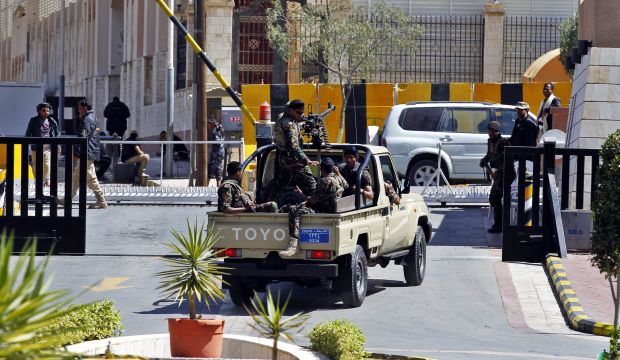
Heavily armed Yemenis guard the entrance to the hotel where representatives of warring factions in Yemen are attending closed-door talks under UN auspices in Sana’a, Yemen, on February 5, 2015. (EPA/Yahya Arhab)
Cairo, Asharq Al-Awsat—Former South Yemen President Ali Nasser Muhammad has said he would accept an invitation to chair a presidential council to fill the power vacuum in Yemen only if political factions endorsed a two-region federal state solution to the crisis.
Speaking to Asharq Al-Awsat from his residence in Cairo, Muhammad said: “Both the north and the south has its own problems which must be dealt with within the framework of a comprehensive two-region federal state solution.”
Muhammed was twice president of South Yemen in 1978 and 1980-1986.
The exiled politician is seen as a prominent contender to chair an interim presidential council following the resignation of President Abd Rabbuh Mansur Hadi and his government.
The proposal is still being heavily debated among Yemen’s political factions.
Muhammad said he has not been informed as to whether a consensus has been reached over his chairmanship, and that the Houthis and other political factions participating in consultative talks in Sana’a are yet to determine the structure of the council.
Responding to a question about whether he intends to accept the offer to chair the council, Muhammad said: “It depends on whether Sana’a accepts the [federal state] solution I have put forward.”
Muhammad said he would put the issue forward to the political factions in southern Yemen, which are currently divided over the form of any future state. While some back federalization, others in southern Yemen call for complete autonomy from Sana’a.
Meanwhile, Yemen’s political factions resumed talks on Thursday, under the aegis of the UN, to try to end the chaos that has engulfed their country since the Houthis captured Sana’a in September last year, and the subsequent resignation of Hadi and his premier Khaled Bahah.
The talks hit some obstacles on Wednesday after participants failed to reach a conclusive agreement on how to fill the vacant presidential seat. Several parties walked out of the talks, demanding that the Houthis lay down arms across Yemen as a condition to any power-sharing deal.
A participant at the talks, who spoke to Asharq Al-Awsat on the condition of anonymity, said Thursday’s discussions were almost entirely centered on the issue of forming an interim presidential council and who is to serve on it.
“Resolving the membership of the council is any easy matter but as for its powers, they will be similar to those of the president as stipulated by the constitution,” the Secretary-General of the liberal Justice and Construction Party Abdel Aziz Jubari told Asharq Al-Awsat.
The council will serve for two years after its members take the constitutional oath of office before parliament.
He said: “Among the specific and difficult tasks facing the council will be the drafting of a new constitution . . . and holding presidential and parliamentary elections.”
“It has been agreed to form a national unity government,” Jubari said, but a prime minister is yet to be selected.
“Debate continues on the size of the representation of blocs in the government. While some argue in favor of equal representation, others propose that major blocs get the lion’s share.”
Political sources in Sana’a told Asharq Al-Awsat that the UN Envoy Jamal Benomar “is trying to use diplomacy to pressure Tehran to convince the Houthis . . . to deal with the issue of partnership on the basis of consensus.”
The Shi’ite group is believed to enjoy the backing of Iran.
For his part, Yemeni presidential adviser Faris Al-Saqqaf said the Houthis are seeking to monopolize power and that the political parties taking part in the UN-sponsored talks have come under pressure from their supporters to pull out of the dialogue.
Arafat Madabish contributed reporting from Sana’a
